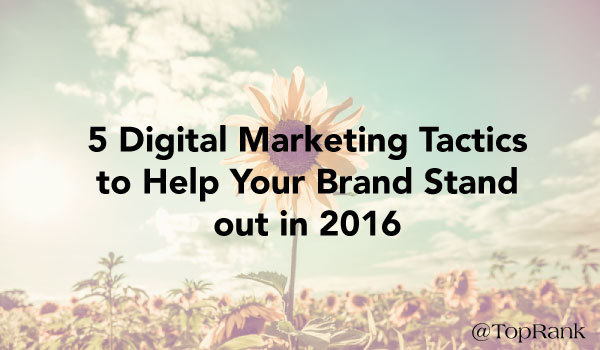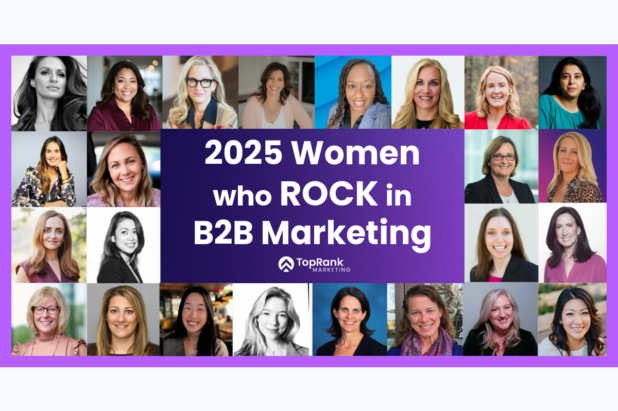
It’s tempting to think of your brand as a beautiful and unique flower. You believe in the work you do, you take pains to know your audience and craft messages that should resonate with them. So you bring your exquisite rose to the world—only to find they’re standing waist-deep in a flower garden.
In the crowded content market, it’s entirely possible to do everything right and still struggle to capture attention. Knowing your audience, doing the research, and making great content are the new table stakes. To really get noticed, you must be exceptional.
Here are five digital marketing tactics that can get your brand noticed, with examples from brands that are doing it right.
#1 – Use Existing Platforms in Creative Ways
When you’re running a fitness apparel company like Lululemon, there are some pretty obvious social media plays. You can encourage users to post pictures on Instagram, pin collections on Pinterest, and offer deals on Twitter. But Lululemon found a creative way to reach their audience—curated Spotify playlists.
The company knew their customers liked to listen to music while they worked out—and reasoned there were plenty of potential customers searching for the perfect cardio-pumping playlist as well. Lululemon’s mixes are extremely popular on Spotify, and the company releases new playlists for special events throughout the year.
Should your company be putting together a mixtape for your audience? Maybe not, maybe so. But it’s worth taking a look at your customer’s whole life, not just the part that involves your brand, to see if you can reach them in a new and helpful way.
#2 – Partner with the Right Influencers for Your Audience
At first glance, Gap’s styld by fashion blog might not seem like influencer co-created content. There are pictures of models in clothes, with a block of text to the right describing what they’re wearing. The models are not famous faces—they look like people you might see in your day-to-day life, not in a YouTube video with a million hits.
That’s because Gap courted influencers that matter to their target audience, rather than going for more widely known names. Their models are fitness instructors and fashion bloggers, people with a jealousy-inducing personal lifestyle and plenty of street cred. Many of the posts include the model’s thoughts on the outfit—what they like about it and how it fits into their personal style.
As we observed in our Influencer Marketing predictions post, co-created content has finally hit the marketing mainstream. When you think “influencer,” you might think of someone hugely famous. But the right influencer for your audience might be someone less well-known but more respected in their specific community. The influencers might be your community, in fact—create a space for your customers to tell their stories, and the results can be incredibly compelling.
#3 – Keep It Extra Real
“Transparency” is one of those words that began with the best of intentions, but has been abused to the point where it’s a meaningless buzzword. So Buffer went beyond transparency—all the way into brutal honesty about its company’s inner workings.
Buffer could stick to how-to posts, social media news, and case studies of their successes, but the Buffer blog just as frequently highlights their failures and insecurities. Posts like The 50 Things I’m No Good at on Social Media and Why Building an Audience Is So Hard (And Why I’m Still Trying) put a human face on the company, inspiring other marketers by identifying common struggles.
It might seem counterintuitive to tell potential customers what you don’t know and what you struggle with. But admitting your flaws actually increases your credibility—it shows that the fallible humans behind your brand are still learning and evolving. You can admit you don’t have all the answers, then invite your audience to learn with you.
#4 – Explore Humor. You Too, B2B!
There has been a huge push recently to add humor into marketing. Which, as someone who has spent a decade as a comedian and a year as a marketer, I appreciate a whole lot. There are some companies, though, that couldn’t possibly elicit chuckles. Take Cisco, for example. They sell B2B data storage and routing solutions. Not really the stuff that kneeslappers are made of.
Or so you might think, if you haven’t seen the comedic genius of Fast Innovations and the Slow Waiter. Cisco rounded up leaders in the IT industry to talk about their IT infrastructure for a video series. Then instead of dull talking head videos, they set the series in a restaurant and had the “industry’s slowest waiter,” a comedian playing a character, do the interviews. The resulting videos get across all the technical information Cisco wanted to convey, but they’re also genuinely funny. In a staid industry like IT, the videos made a huge impact.
So B2B folks, don’t be afraid to use humor (as long as it’s appropriate to your brand identity). “Professional” doesn’t have to mean “dull.” Your B2B clients are humans just like the B2C customers, and they have the same desire to be entertained while they’re being informed.
#5 – Take a Stand
When can a retailer make more money by staying closed on a day when all its competitors are open? When the act of staying closed is a statement of the brand’s values. Sporting goods retailer REI turned Black Friday on its head this year. The so-called “busiest shopping day of the year” usually has stores scrambling to open earlier and offer better bargains than competitors. But REI’s CEO released a statement that REI would be closed all of Black Friday.
REI encouraged their customers to head outdoors with their loved ones rather than spend the day fighting crowds for bargains. The #optoutside website let customers pledge to spend the day enjoying nature, and collected Instagram photos with the hashtag to encourage a sense of community. 1.4 million customers took the pledge, and REI earned credibility with its audience (and a tremendous amount of free press).
It can be worth the risk to take your company’s values from your mission statement to the streets. As REI demonstrated, it’s the ultimate way to let your customers know you understand them and share their values. Take a stand, start a community, and you may build a movement that is far bigger than your brand.
The brands in this article all have one thing in common: they bring humanity and personality to their marketing in a way that demonstrates they care about their audience. This human touch is the way to rise above the faceless corporations using safe, bland messaging. Want your audience to see what a beautiful, unique flower your brand is? Make sure it’s a wildflower.
Is your brand ready to stand out in 2016? We’re happy to help.
Header image via Shutterstock


